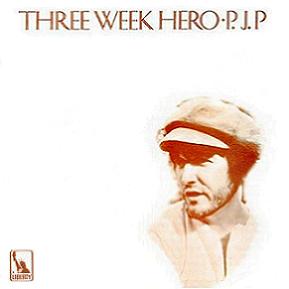Revision as of 00:38, 30 May 2009 by imported>Meg Taylor
| Three Week Hero
|

|
| Type
|
Studio album
|
| Artist
|
PJ Proby
|
| Release Date
|
8 April 1969
|
| Recorded
|
September 1968 at Olympic Studios, London.
|
| Genre
|
Rock, blues rock, pop
|
| Language
|
English
|
| Length
|
39 min 26 sec
|
| Label
|
Liberty Records
|
| Catalogue
|
LBS 83219 (US), LBL 83219 (UK)
|
| Producer
|
Steve Rowland
|
| Engineer
|
Mike Weighell & John Macswith
|
Three Week Hero is an album released by rock singer PJ Proby on 8 April 1969, by Liberty Records. The album contains a mixture of dramatic pop, blues, rock, and country style songs, a departure from Proby's trademark pop sound of the 1960s. While it did not succeed commercially, it is best remembered today as the first time all four members of Led Zeppelin recorded together in the studio, which revived interest in the recording.[1] Proby recollects:
| “
|
Come the last day we found we had some studio time, so I just asked the band to play while I just came up with the words. ... They weren't Led Zeppelin at the time, they were the New Yardbirds and they were going to be my band.[2]
|
”
|
Jimmy Page had previously sessioned for Proby on his biggest success "Hold Me", which reached number 3 in the UK charts. Other sessions soon followed for "Zing! Went the Strings of My Heart", "Stagger Lee", "Linda Lu", "Rockin' Pneumonia and the Boogie Woogie Flu", and "Hanging from Your Love Tree". Due to poor managerial and investment advice, Texan-born Proby was declared a bankrupt in the United States in 1967, and decided to try his luck in the United Kingdom by relocating there in 1968. Members of Led Zeppelin were invited to participate after John Paul Jones had already pre-booked the session as a commitment prior to August 1968.[3] The medley "Jim's Blues/George Wallace Is Rollin' In This Mornin'," features all four members with Robert Plant playing harmonica and tambourine. "Today I Killed a Man" reached number 13 on the Dutch singles chart,[4] an American Civil War song ostensibly redirected towards the Vietnam War. Many of the ideas behind these songs would be revisted on The Family Dogg's 1969 album A Way of Life, whose members appeared as backing singers, and this release was also produced by Steve Rowland. The song "Sugar Mama" recorded by Led Zeppelin at Morgan Studios in 1969, is not the same "Sugar Mama" recorded on this album. The album was reissued on CD in October 1993.
| Album information
|
|
Track listing:
- "Three Week Hero" (John Stewart) – 2:56
- "The Day That Lorraine Came Down" (Young) – 3:14
- "Little Friend" (Robin Gair, Peter Mason) – 4:01
- "Empty Bottles" (Albert Hammond, Mike Hazlewood) – 2:53
- "Reflections (of Your Face)" (Amory Kane) - 5:14
- "Won't Be Long" (J Leslie McFarland) - 3:41
- "Sugar Mama" (Woodley, Young) – 2:50
- "I Have a Dream" (Terry Hansley, Alec Wilder) – 4:45
- "It's Too Good to Last" (Baker, Stephens) – 3:14
- "New Directions" (Albert Hammond, Mike Hazlewood) – 3:46
- "Today I Killed a Man" (Roger Cooke, Roger Greenway) - 3:24
- Medley: "It's So Hard to Be a Nigger/Jim's Blues/George Wallace is Rollin' in This Mornin'" (Hillery, traditional) – 7:38
|
Chart history
Album
| Chart (1969)
|
Peak position
|
| US Billboard The 200 Albums Chart
|
-
|
Singles
| Year
|
Single
|
Chart
|
Position
|
| 1969
|
"Today I Killed a Man"
|
US Billboard Hot 100 Singles Chart (Pop Singles)
|
-
|
| Personnel
|
- Musicians:
- PJ Proby - vocals
- Jimmy Page – acoustic, electric, and pedal steel guitar
- Robert Plant – harmonica, tambourine, backing vocals
- John Paul Jones – bass guitar, piano, organ, arranger
- John Bonham - drums, conga, percussion
- Amory Kane - acoustic guitar, strings
- Alan Parker - electric guitar
- Alan Hawkshaw - piano, organ
- Clem Cattini - drums
- Stan Barrett - percussion
- Dennis Lopez - percussion
- The Jericho (The Family Dogg with Bob Henry) - backing vocals ("Won't Be Long" and "I Have a Dream")
- Production:
- Steve Rowland – producer, arranger ("It's So Hard ..." medley)
- Reg Tilsley - arranger ("Reflections (of Your Face)")
- Mike Weighell - engineer (Lansdowne studio)
- John Macswith - engineer (Lansdowne studio)
- Spencer Leigh - liner notes
- Gustav Karl Moody - art direction, cover design
- Anthony Lloyd Parker - photography
- Steve Thomas - art direction
|
Notes
